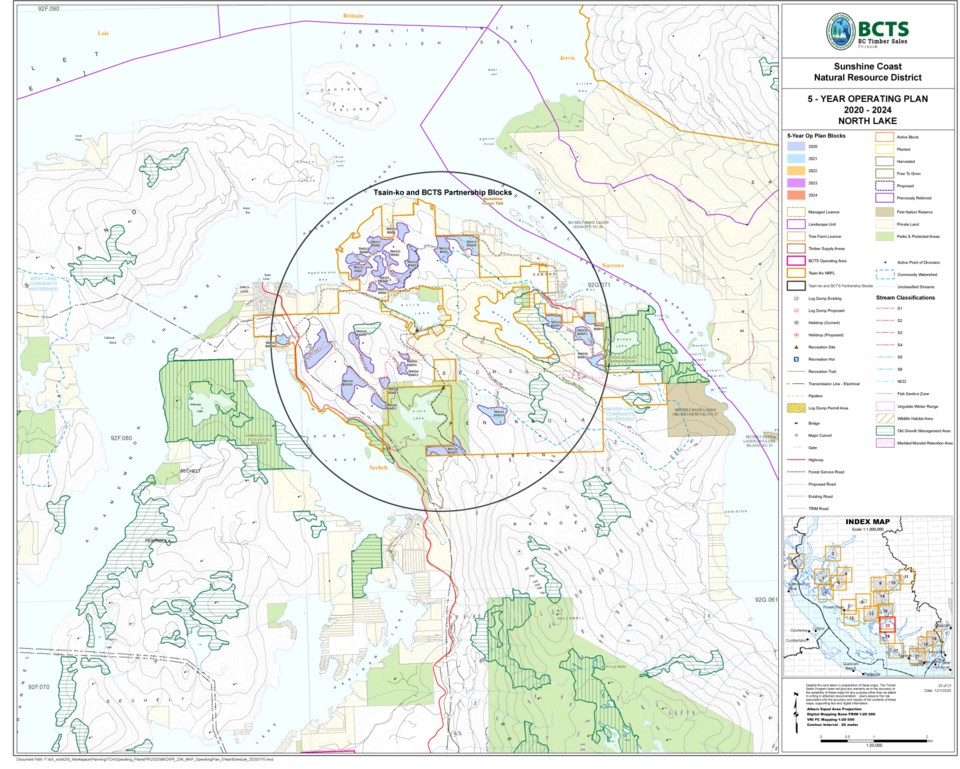BC Timber Sales (BCTS) and Tsain-ko have agreed to meet with residents for a second time after hearing their concerns that logging in the Egmont area could threaten drinking water, harm the economy and create traffic problems during the height of tourist season.
Tom Johnson, woodlands manager for BCTS’s Chinook business area, said BCTS and Tsain-ko agreed to meet again with the North Lake Residents’ Association and Egmont Community Club in mid-March. He told Coast Reporter the cutblocks slated for harvesting in 2020 are “in the early stages of development” and “plans will be fine-tuned as we move forward.”
At separate meetings with the two organizations on Feb. 13, residents sought information on how the logging proposed for 2020 and 2021 would affect their neighbourhoods and recreation areas essential to the tourism industry.
The 20 minutes allotted forced speakers to rush through their presentations, said Tom Silvey, who spoke on behalf of the Egmont Communty Club. Several water sources could be impacted by cutblocks, including one that’s located in the Waugh Lake watershed reserve, according to Silvey.
Another major concern is the “irreparable damage to the community’s main economy, which is tourism and eco-tourism,” he said in his presentation. Both the Skookumchuck Rapids trail and the Suncoaster Trail could be affected by nearby logging, as well as the Klein Lake campsite.
North Lake Residents’ Association president Rick Craig told Coast Reporter the first meeting was “frank and constructive.” The executive presented a list of 25 questions reflecting residents’ concerns. “We are concerned about North Lake water quality, the number of trucks and volumes of timber that may be trucked out though North Lake Road, damage to the road and residences.”
Both groups shared concerns that that increased traffic on narrow public roads could create safety risks, especially if cutting takes place during the summer when recreation traffic is substantial.
Also in attendance was Kim Tournat, representing MLA Nicholas Simons, Sechelt Mayor Darnelda Siegers and Sunshine Coast Regional District Area A director Len Lee, who said the discussions were “very respectful.”
“There is going to be logging, that’s the bottom line of it, so I think the best thing that everybody can do is figure out how to mitigate the visual appeal of it and also the impact on the tourism, because you don’t want logging trucks up and down the road in prime tourist season,” Lee told Coast Reporter.
Tsain-ko, the economic development arm of the shíshálh Nation, has a non-replaceable five-year forest licence for the area, and according to Lee, “there is some urgency to get it done,” since the organization is nearly two years into the licence. “I believe Tsain-ko is a really good choice. They’re concerned about the community, they’re concerned about nature itself and the impact of logging. They’re as respectful as possible,” Lee said.
Twenty cutblocks are listed as “development ongoing” in BCTS’s operating plans, with 17 slated to be harvested this year, covering 134 hectares. The remaining cutblocks, comprising 51 hectares, have been scheduled to be harvested in 2021. Some blocks are clustered around North Lake and east of Ruby Lake. Others edge Klein Lake and Skookumchuck Narrows Provincial Park.



